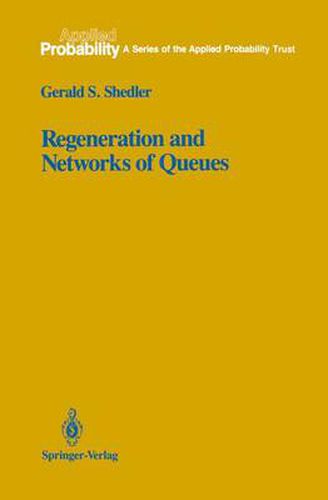Readings Newsletter
Become a Readings Member to make your shopping experience even easier.
Sign in or sign up for free!
You’re not far away from qualifying for FREE standard shipping within Australia
You’ve qualified for FREE standard shipping within Australia
The cart is loading…






This title is printed to order. This book may have been self-published. If so, we cannot guarantee the quality of the content. In the main most books will have gone through the editing process however some may not. We therefore suggest that you be aware of this before ordering this book. If in doubt check either the author or publisher’s details as we are unable to accept any returns unless they are faulty. Please contact us if you have any questions.
Networks of queues arise frequently as models for a wide variety of congestion phenomena. Discrete event simulation is often the only available means for studying the behavior of complex networks and many such simulations are non Markovian in the sense that the underlying stochastic process cannot be repre sented as a continuous time Markov chain with countable state space. Based on representation of the underlying stochastic process of the simulation as a gen eralized semi-Markov process, this book develops probabilistic and statistical methods for discrete event simulation of networks of queues. The emphasis is on the use of underlying regenerative stochastic process structure for the design of simulation experiments and the analysis of simulation output. The most obvious methodological advantage of simulation is that in principle it is applicable to stochastic systems of arbitrary complexity. In practice, however, it is often a decidedly nontrivial matter to obtain from a simulation information that is both useful and accurate, and to obtain it in an efficient manner. These difficulties arise primarily from the inherent variability in a stochastic system, and it is necessary to seek theoretically sound and computationally efficient methods for carrying out the simulation. Apart from implementation consider ations, important concerns for simulation relate to efficient methods for generating sample paths of the underlying stochastic process. the design of simulation ex periments, and the analysis of simulation output.
$9.00 standard shipping within Australia
FREE standard shipping within Australia for orders over $100.00
Express & International shipping calculated at checkout
This title is printed to order. This book may have been self-published. If so, we cannot guarantee the quality of the content. In the main most books will have gone through the editing process however some may not. We therefore suggest that you be aware of this before ordering this book. If in doubt check either the author or publisher’s details as we are unable to accept any returns unless they are faulty. Please contact us if you have any questions.
Networks of queues arise frequently as models for a wide variety of congestion phenomena. Discrete event simulation is often the only available means for studying the behavior of complex networks and many such simulations are non Markovian in the sense that the underlying stochastic process cannot be repre sented as a continuous time Markov chain with countable state space. Based on representation of the underlying stochastic process of the simulation as a gen eralized semi-Markov process, this book develops probabilistic and statistical methods for discrete event simulation of networks of queues. The emphasis is on the use of underlying regenerative stochastic process structure for the design of simulation experiments and the analysis of simulation output. The most obvious methodological advantage of simulation is that in principle it is applicable to stochastic systems of arbitrary complexity. In practice, however, it is often a decidedly nontrivial matter to obtain from a simulation information that is both useful and accurate, and to obtain it in an efficient manner. These difficulties arise primarily from the inherent variability in a stochastic system, and it is necessary to seek theoretically sound and computationally efficient methods for carrying out the simulation. Apart from implementation consider ations, important concerns for simulation relate to efficient methods for generating sample paths of the underlying stochastic process. the design of simulation ex periments, and the analysis of simulation output.